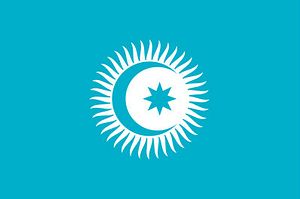A gathering of information and media officials from the Cooperation Council of Turkic Speaking States (CCTSS) met in Astana, Kazakhstan recently and signed a protocol to create an international Turkic news channel. The protocol was prepared between the national television channels of the Turkic Council member states Azerbaijan, Turkey, Kazakhstan and Kyrgyzstan.
The Turkic Council was formed in 2009 to promote cooperation among Turkic speaking countries. With the exception of Tajik (which is an Indo-European language related to Persian), the languages of modern Central Asia (Kazakh, Kyrgyz, Turkmen, and Uzbek) are Turkic. Turkmenistan and Uzbekistan, while potential members of the council, have not joined.
Representatives from national TV channels, official news agencies, and other relevant authorities attended a meeting, their fourth, to finalize the draft agreement to establish an international Turkic news channel. According to a release from the Council, the coordination group discussed
drafts of memorandum of understanding on cooperation among news agencies, a protocol of cooperation among national TV channels, and a declaration of cooperation on information and media which were then signed during the first meeting of the ministers and high officials for information and media from member states.
The meeting of information and media ministers and high officials was attended by Ali Hasanov, Assistant of the President of the Republic of Azerbaijan, Altynbek Maksutov, Minister of Culture, Information and Tourism of the Kyrgyz Republic and Şenol Göka, Director General of the Turkish Radio and Television Corporation. They were hosted by Asset Issekeshev, Minister of Investment and Development of the Republic of Kazakhstan.
During his remarks, Ali Hasanov pointed to destabilizing factors and what he says is the misrepresentation of Turkic speaking countries in international media. He specifically pointed to coverage of the 2015 Baku European Games, saying “certain international media outlets consistently published hostile materials against our country, which means that in our time the media are increasingly used as a tool of political pressure.”
Ahead of the June sporting event, human rights organizations denounced the Azeri government for arresting critics and denying entry to a journalist from the Guardian.
“In addition, with the expansion of our success as an independent state we often face media attacks based on preconceived, false accusations,” Hasanov said.
Hasanov commented that Azerbaijan’s plight was analogous throughout the Turkic speaking world. “A perfect example of this is a dirty campaign regularly conducted by the global media against Turkey, which outstrips many leading countries in terms of political and economic progress.” According to Trend, the “dirty campaign” was followed by comments that the international media routinely attacks Turkey over the “fictional and false genocide.”
“And a paucity of alternative media resources limits our opportunities to make counter-theses,” Hasanov said. “We see the same in Kazakhstan, Kyrgyzstan, and other fraternal countries that are part of the Turkic world.”
Hasanov proposed that attacks against Turkic speaking countries were systematic and coordinated “from a single center” for a single purpose “to prevent the development, unity and equality of our countries.”
The initiative to create an international Turkic news channel can be viewed, at the extremes, in two ways: as either an attempt to correct the international record about Turkic speaking countries or an effort to institutionalize the dissemination of propaganda. The truth is somewhere in between. While there is great value in news created and disseminated in the native language by local journalists providing an experienced and culturally nuanced perspective on regional developments, some of Hasanov‘s comments are worrying with regard to control of the messages communicated.
One of the aims of establishing such a channel is “consolidating efforts towards preventing smear campaigns against our countries.” Hasanov also says,“I would like to note that this channel will respect internal affairs of countries.” What exactly does that mean? Journalism is, in the simplest definition, a way for people to provide checks and balances on governments–and that often means poking into the inner workings of politics and policy. Although Hasanov’s comments are clearly colored by Baku’s recent experiences under the sometimes harsh gaze of international media, the experience is mirrored throughout the Turkic world.
































